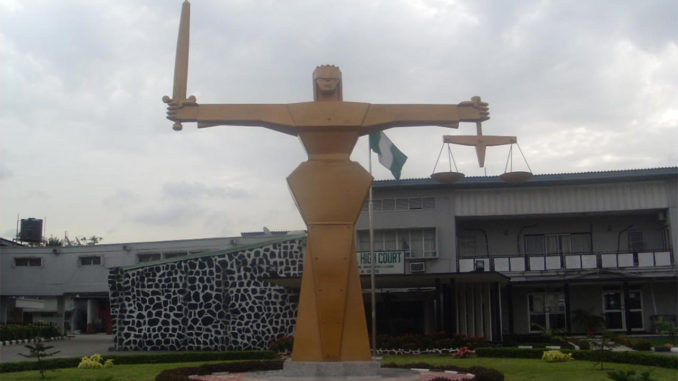
The Nigerian judiciary came to the fore recently when the National Judicial Council (NJC) recommended two judges – Justice Adeniyi Ademola and Justice O.O. Tokode – for compulsory retirement on account of proven cases of misconduct. NJC also recommended other judges for various forms of punishment over actions that impugned the integrity of the nation’s judicial system. This is a welcome development.
Indeed, the NJC remained docile for too long. This wakeup action is therefore commendable.
Any nation which tolerates a corrupt judiciary can never entrench justice. Lady Justice balancing the scales goes back into antiquity. As an embodiment of divine law, and order and custom, she personified the rightness and justness of law.
The picture of the blind woman holding the scales of justice is fundamental to the dispensation of justice. It presupposes that the law is even handed and metes out punishment to whoever runs foul of it.
Judges all over the world are held in high esteem. They are known or presumed to be men of honour that cannot and should not yield to the gaudy and ephemeral attraction of filthy lucre.
In a sense, they sit in judgment over man as representatives of God as the ultimate architect and dispenser of justice. To compromise their exalted positions therefore is tantamount to falling from the Olympian heights to which society has elevated them.
For over two decades there had been muffled complaints about incipient unethical practices in the Nigerian judiciary. Things blew into the open when some serving judges, notably Justices Kayode Eso and Alooma Mukhtar at different times boldly acknowledged and decried the level of corruption on the Bench. During elections, verdicts were sold to the highest bidders.
In some cases judges were reported to write two judgments, in preparation for who offered the highest bribe. The Supreme Court, the bastion of justice in the land was not spared the tar of fraudulent verdicts. As we write some Justices of the Supreme Court are under investigation. This is the height of travesty and tragedy on the altar of the legal system.
cTransparency International has decried corruption in the judiciary across the world. It states that political and money pressures often make judges compromise the ideals of justice. Indeed, so many persons who encounter the judicial process in the country come away with disheartening stories.
Slow court processes, inefficiency and poor infrastructure and facilities all contribute to the abuse of court processes. Often corruption in the system is a chain.
Court clerks, registrars and the judges themselves are neck deep. Some lawyers pay for their matters to be fast-tracked. Tricks and subterfuges are also employed to thwart the ends of justice after money has changed hands.
The truth is that the Nigerian judiciary is a sad reflection of the dominant and common ethos of the larger society. The image of the ‘incorruptible judge’ which once held sway has vanished. Judges no longer abide by the disciplinary ethics of their profession. Some are seen hobnobbing with politicians and shady characters.
Some highly placed lawyers of the status of Senior Advocates of Nigeria (SAN) have been reported to perfect ways of ‘settling’ judges. Payments are often in foreign currencies. This is rampant.
The NJC should put its house in order. As for the Appeals Court recent judgment which barred anti-corruption agencies from arresting or prosecuting serving Justices, it is our considered view that the laws of the land should be obeyed by all and sundry.
No group of persons should be placed above the law. If the NJC had lived up to its responsibilities the current level of decadence in the judiciary at all levels would not have arisen.
We therefore call on all stakeholders in the judiciary to join the fight to cleanse the judiciary. The Executive branch, dominated by desperate politicians, should also lead by example by respecting the judiciary when court orders are given. They should stop offering mouth-watering bribes on election and other cases. The NJC should also play its role in ensuring that reported cases of corruption are promptly investigated and dealt with.
Frivolous petitioners should also be punished. Court procedures should be made more efficient. Duration of cases should be within reasonable time limits as specified by the law.
Finally, it is apposite to state that it is the judges themselves that can restore the honour of the judiciary through a conscientious pursuance of the ends of justice. The NJC has a crucial role to play.
Let the current tough actions of the NJC be a watershed in the history of the judiciary in Nigeria. Are the honourable Justices ready for this role? Time will tell.
END

Be the first to comment